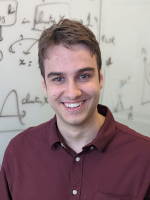
Student Profiles

1 Search Results

James Anibal
NIH Oxford Scholar
B.S. Computer Science, Case Western Reserve University, 2020
Dr. Bradford Wood (NCI) and
Prof. David Clifton (Oxford)
Precision medicine, Deep learning, Signal Processing
James Anibal attended Case Western Reserve University (CWRU) from 2016-2020, earning a B.S. in Computer Science. After his second year at CWRU, James began his research career at the National Cancer Institute under the mentorship of Dr. Grégoire Altan-Bonnet. His projects involved (I) developing machine learning algorithms for single-cell data analysis and (II) developing natural language processing (NLP) methods for biomedical text mining. From this research, James has published in Science and Journal of Clinical Investigation. He has also published a biomedical question-answering system on the Hugging Face NLP platform. In summer 2021, James worked as a research scientist at Afiniti, a multinational company aiming to improve business outcomes through AI-driven pairing of staff and customers. For his graduate studies, James is interested in scalable AI methods for noisy health data from devices such as wearable sensors and smartphones, working with partners around the world to develop novel digital health systems. Upon graduation from Oxford, James plans to continue building AI models for personalized medicine.


